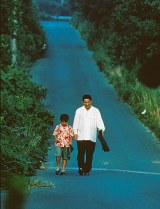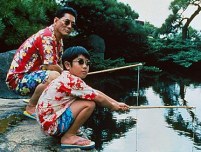Kikujiro
aka Kikujiro no natsu |
| |
 |
Japanese language. Japan, 1999.
Rated PG-13. 121 minutes.
Cast: Takeshi Kitano (as "Beat" Takeshi),
Yusuke Sekiguchi, Kayoko Kishimoto, Kazuko Yoshiyuki, Beat Kiyoshi, Great
Gidayu, Rakkyo Ide, Nezumi Mamura, Fumie Hosokawa, Yűko Daike, Akaji Maro
Writer: Takeshi Kitano
Music: Jô Hisaishi
Cinematographer: Katsumi Yanagishima
Producers: Masayuki Mori, Takio Yoshida
Director: Takeshi Kitano
LINKS
|
 ikujiro
is a comedy. Know that going in, because otherwise you might not realize it
until the film is half over. Being a Takeshi Kitano movie, Kikujiro is
as subdued as a comedy can get. But if you pay close attention, you may find
Kikujiro to be hilarious.
ikujiro
is a comedy. Know that going in, because otherwise you might not realize it
until the film is half over. Being a Takeshi Kitano movie, Kikujiro is
as subdued as a comedy can get. But if you pay close attention, you may find
Kikujiro to be hilarious.
Kikujiro concerns a lonely young boy on his summer vacation. Nine-year
old Masao has no one to play with. He lives alone with his grandmother (Kazuko
Yoshiyuki), who is often away at work, and all his friends are out of town.
One day Masao chances upon his absent mother's address and decides to set out
looking for her, despite his lack of money and her living in a distant city.
It's a bad idea to begin with, but it gets worse. Shortly after starting his
journey, Masao runs into one of his grandmother's friends (Kayoko Kishimoto),
who insists that her indolent husband, Kikujiro (Kitano), accompany the boy.
(Kishimoto also co-starred as Kitano's wife in his previous film, the superb
Hana Bi.)
Kikujiro (whom Masao knows only as "Mister") is, basically, a jerk. He is abusive,
loud-mouthed, and irresponsible. A former Yakuza put out to pasture,
he's not above petty thievery. He is also an avid gambler. The first thing Kikujiro
does is take Masao to the racetrack, where Masao accidentally picks winning
numbers. In one of the film's funniest scenes, a long series of losing bets
is cut into a progressively more ludicrous conversation in which Kikujiro berates
Masao into picking more numbers. By the end, Kikujiro has blown all the travel
money given him by his wife, and Masao's allowance to boot.
Although Kikujiro is unpredictable, even haphazard, it doesn't take
a genius to guess that the man and the boy will eventually effect positive changes
in one another. But Kikujiro is no Jerry Maguire or–god forbid–Big
Daddy. There is no Pivotal Moment at which Kikujiro has an epiphany about
his feelings. There is no Heartfelt Speech. (In fact, there isn't even a Big
Climax. The closest thing comes with a half hour of movie still to go.) Kikujiro
and Masao remain their essential selves throughout the movie. Masao gradually
comes out of his shell, and the changes in Kikujiro are expressed mainly by
the fact that he starts browbeating people in order to achieve Masao's goals
rather than his own.
Comedy is usually funniest when you can recognize real people at the heart
of it. In Kikujiro the farcical elements work because Kitano allows the
humor to flow organically from the characters he has painstakingly created,
using juxtaposition to highlight their idiosyncracies and contradictions. Through
their personalities, the characters create the situations, rather than the other
way around, as in the average American sitcom or romantic comedy, which usually
use farcical routines to introduce new characters, who, by being associated
with a specific kind of nutty behavior are then defined by it.
Unlike other Kitano movies, traditionally set amid bloody crime wars, Kikujiro
seems unusual for Kitano, and it is... initially. Though Kitano is a famous
television funnyman in Japan, he hasn't fully shown his comedic side to international
audiences. To play Kikujiro, Kitano, the ultimate minimalist actor, is much
more animated than in previous film works. Of course, that's still pretty low
key. No one will ever accuse him of overacting.
AboutFilm.Com
The Big Picture
|
| Alison |
B
|
| Carlo |
B
|
| Dana |
-
|
| Glenn |
-
|
| Jeff |
B
|
| Kris |
B
|
Despite farce and flights of fancy, Kikujiro fits neatly into Kitano's
filmography. By the end of the two hours, fans of Sonatine
and Hana Bi (a.k.a. Fireworks)–Kitano's best-known works in the
United States–will recognize his favorite themes and motifs. All these films
advocate learning to let go of your cares and responsibilities in order to celebrate
the simple joys in life.
Though Kitano's visual style in Kikujiro is far more whimsical than
in other films (watch for the digitally inserted Octopus Man fig leaf!), he
maintains his meticulous eye. Each composition is a thing of beauty and possesses
a slightly alien quality that we Americans might be tempted to call "Asian,"
but is probably unique to Kitano's films. Kikujiro contains more panning
and zooming than Hana Bi, whose compositions possess the stillness of
rock gardens, but Kikujiro's style is similarly detached–which often
has the effect of making farcical situations seem funnier.
Kitano overreaches, however, in his effort to add symbolic weight to the light
story, which makes it seem overlong. The narrative framework, a series of illustrated
journal entries entitled "What I Did on My Summer Vacation," is also unnecessary.
Kikujiro is not so much a story as a series of vignettes, each tied
loosely to Masao's search for his mother. Whether Masao finds her is beside
the point. The film is really about Masao's loneliness–and Kikujiro's loneliness,
too. Like Sonatine and Hana Bi, Kikujiro eventually takes
a weird, playful detour, during which the greedy, opportunistic Kikujiro, like
the Yakuza in Sonatine, learns that if you spend all your life
grasping for something more, you wind up holding nothing at all.
Review
© July 2000 by AboutFilm.Com and the author.
Images © 1999/2000 Sony Pictures Entertainment.
All Rights Reserved.


